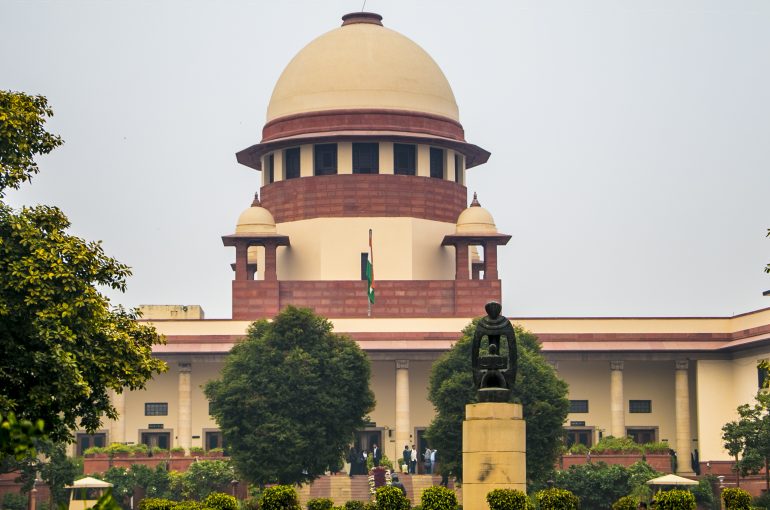SUPREME COURT RE-AFFIRMS STRICT PLEADING REQUIREMENT FOR ADVERSE POSSESSION CLAIMS

In a pivotal judgment, the Supreme Court of India rejected a plea based on adverse possession in the case of Kishundeo Rout & Ors. v. Govind Rao & Ors., holding that such a claim cannot be sustained unless a clear, specific foundation of the same is laid in the pleadings.
The verdict, delivered by Justices J.B. Pardiwala and R. Mahadevan, upholds well-established legal principles and clarifies the boundaries of when adverse possession can be considered by appellate courts in Indian property disputes.
BACKGROUND OF THE CASE
The dispute originated in Title Suit No. 35 of 1999 before the Civil Judge, Deoghar. The plaintiffs sought declaration that a 1997 sale deed (No. 256) in the defendant’s favour was bogus and inoperative, confirmation of possession, and a permanent injunction. The trial court dismissed the suit, finding the sale deed valid and the claims of fraud unsubstantiated.
On appeal, the District Judge reversed this outcome, invoking the doctrine of adverse possession to declare the plaintiffs as exclusive owners of part of the property. This was despite the fact that a plea of adverse possession had not been raised in the original pleadings.
The High Court of Jharkhand, on further appeal, set aside the appellate decree, emphasizing the absence of foundational pleadings for adverse possession and noting that any declaration of such title during suit pendency was impermissible.
COURT’S ANALYSIS AND FINDING
- Foundation in pleadings mandatory: The Supreme Court reiterated that the foundation for a plea of adverse possession must be specifically set out in the pleadings. It is not a mere legal argument but a fact-intensive claim, requiring the claimant to state clearly when and how possession started, its adverse character, its knowledge to the true owner, and that such possession was open, continuous, and hostile for the statutory period.
- Adverse possession not to be introduced in appeal: The Court emphasized that unless the facts and issues relating to adverse possession were raised at the trial stage, such a claim cannot be introduced for the first time in appeal. The party seeking to rely on this doctrine cannot spring it as a surprise at the appellate level.
- Pleadings and proof must correspond: Quoting past precedents, the bench stressed that no party should be prejudiced by departure from their original case. Success must be based on what is alleged and proved, otherwise, it would amount to unfairness and uncertainty in judicial proceedings.
- Exception only when facts are uncontroverted: The Supreme Court noted limited circumstances where, if the underlying facts establishing adverse possession are clear, admitted, and beyond controversy and the opposing party is not unfairly prejudiced, a court may consider the plea even if not framed precisely. In this case, however, the lack of pleadings, issues, and evidence made such an exception inapplicable.
DIRECTIONS/OUTCOMES
- The Supreme Court affirmed the decision of the High Court and dismissed the plaintiff’s petition entirely.
- It was held by the Hon’ble Apex Court that since adverse possession was neither pleaded nor proved at trial, the first appellate court erred in decreeing title in favour of the plaintiffs on that ground.
KEY TAKEAWAYS FROM THE JUDGEMENT
- Adverse possession must be pleaded specifically—mere reliance on long possession is insufficient.
- Appellate Courts are barred from considering new adverse possession claims not rooted in original pleadings and issues.
- The decision upholds procedural fairness and affirms that parties cannot succeed on grounds outside their case as originally set.
- The claimant must plead and prove all elements of adverse, open, and hostile possession spanning the statutory period.
CONCLUSION
This Supreme Court ruling is a robust reaffirmation of the principles of pleadings and procedural fairness in Indian civil litigation. By disallowing the introduction of an adverse possession plea at the appellate stage without a foundation in the original plaint, the judgment safeguards against trial by ambush and preserves both the integrity of the process and the rights of all litigants.
Claims of adverse possession thus remain exceptional, available only to those who clearly plead and prove every necessary fact from the outset.
Soumen Dash
(Legal Associate)
The Indian Lawyer & Allied Services
Please log onto our YouTube channel, The Indian Lawyer Legal Tips, to learn about various aspects of the law. Our latest Video, titled Religion and Law in India? Constitutional Rights Explained | Advocate Sushila Ram Varma | can be viewed at the link below:
https://www.youtube.com/watch?v=BOwNImOWIJs&list=PLhuS_E7jcT6VdvIfkVI3BZGTCGgfX5xTu&index=2
https://www.youtube.com/watch?v=zOrpU1Jpyjk&t=157s





































Leave a Reply